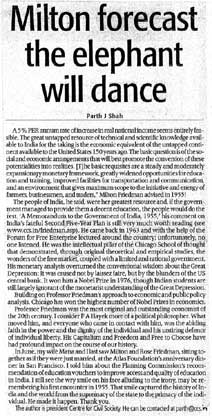Online Articles
Since its launch in 2001, SSA has infused substantial new resources into India’s elementary education. In a sense, even before the Fundamental Right to Education became part of the Constitution, SSA has been striving to fulfill that right of the children in the age group of 6-14. Last year the budget allocation for SSA was Rs 7,800 crore, this year it is Rs 11,000 crore. This is on the top of the massive spending on the universalisation of elementary education.
Muster rolls of public work projects are notoriously abused. Many who are on the official worker list are not actually working on the site and several who are working are not on the roll. Aruna Roy and her organisation MKSS (Majdur Kissan Shakti Sangathan) in Rajasthan took up this issue. The activists would visit a public work site, get a copy of the official muster roll and then verify it, exposing the corruption. After some long battles and initial success, they began to visit more and more sites.
Two questions provide a clue to what needs to be done in our education system: Which two states have the highest rate of literacy in the country? Which two states have the highest proportion of privately managed schools?
‘Rich are getting richer and poor are becoming poorer!’ is now a common refrain in India in any discussion on economic reforms. Since 1991, India has undergone a great deal of liberalization internally and externally. Many feel that the gains of this liberalization and globalization have not accrued to the poor.
Unequal Distribution of Economic Freedom
After 59 years of Independence, 4 out of 10 Indians are illiterate and essentially barred from a prosperous future.
The basic premise of the Right to Information Act is that citizens must ask and directly pay for every piece of information they want from the government. The citizens of India have a right to all the information about the governments of India—local, state and the Union. This right is circumscribed only by the limitations required for official secrets, on what are actually matters of state and security. All information not restricted by those requirements must be available to the citizens as a matter of course, without having to plead, pray or pay.
Adequate and regular supply of water is a serious problem, whether you live in cities, towns, or villages of India. Just think of the rural woman who has to walk several kilometres each day to fetch water and the housewife in a Delhi colony who has to wake up at 3:30 am to turn on the municipal tap. Water reforms are now on the top of the governance agenda. The search is apace for innovative and sustainable solutions.
A budget is an exercise in revenue collection and expenditure. On the former, the best news from Budget was uniform national value added tax (Vat) for goods and services (GST) by April 1, 2010. Therein lies the most efficient way to collect revenues.
From libertarian first principles, Budget 2006 shows hardly any improvement. The Outcome Budget and Performance Budget are still just ideas on the coffee table, they do not inform allocation of funds or assessment of schemes. A government should be judged not by how much it spends but by what it achieves. The finance minister, however, still feels more proud in announcing increases in expenditures and exemptions in tariffs and taxes.
